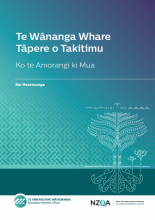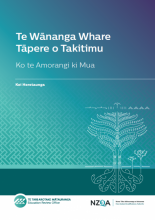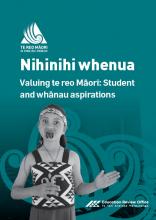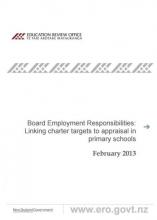- Topics: Enterprise learning, Ethical standards, Oral language, Quality of teaching, School culture, Te Pou Mataaho | Evaluation and Research Māori
- Published: 19 Jan 2021
Te Kahu Whakahaumaru – Ngā mahi a te rangai mātauranga Māori (English)
Te Pou Mataaho, ERO’s evaluation and research group, and Te Uepū ā Motu, ERO’s national evaluation and review team, pursued this evaluation to provide an evidence base about the initial impacts of Covid-19 on Māori-medium education and how the sector responded.
- Published: 19 Jan 2021
Te Kahu Whakahaumaru – Ngā mahi a te rangai mātauranga Māori (Māori)
I whāia tēnei arotake e Te Pou Mataaho, te rōpū arotake, rangahau hoki a Te Tari Arotake Mātauranga me Te Uepū ā-Motu, te rōpū arotake ā-motu a Te Tari Arotake Mātauranga, ki te whakaputa i tētahi kohinga taunakitanga e kitea ai ngā pānga tōmua o te Mate Korona ki te rāngai mātauranga reo Māori, me ngā rautaki i whāia ai e taua rāngai.
- Published: 10 Dec 2020
Te Kahu Whakahaumaru: Māori continue to show resilience across Māori-medium education
In Aotearoa, Māori-medium education experienced significant disruption when the outbreak of Covid-19 forced kura to close their doors, and whānau and kaiako to adjust to home schooling and distance learning. Among the many challenges were access to technology and resources with Māori communities among the most affected.
- Published: 10 Dec 2020
E whakatinana tonu nei te rāngai mātauranga reo Māori i te manawanui
I Aotearoa nei, i tino raru te rāngai mātauranga reo Māori i te horapatanga o te Mate Korona, i kati ai ngā tatau o ngā kura, i mate ai hoki ngā whānau me ngā kaiako ki te tīni i ā rātou mahi ki te whakaako ki te kāinga me te ako tawhiti.
Ko tētahi raru i roto i te huhua, ko te korenga o ngā taputapu matihiko me ngā rauemi, ka mutu ko ngā hapori Māori ērā i rongo i te korekore rawa atu nei.
- Published: 15 Sep 2020
Nihinihi Whenua – Valuing te reo Māori: Student and whānau aspirations
This report provides a snapshot of student and whānau perspectives on the teaching of te reo Māori. It follows the June publication of Te Tāmata Huaroa, which provides a review of the current status of te reo Māori in English medium school settings.
- Published: 18 Jun 2020
Te Tāmata Huaroa: Te Reo Māori in English-medium Schooling
This report gives a snapshot of the current provision of te reo Māori teaching and learning in a representative sample of English-medium primary and secondary schools. The education sector is seen as an important lever in the Government’s Maihi Karauna strategy for language revitalisation.
- Published: 09 Feb 2017
Extending their language - expanding their world: Children’s oral language (birth-8 years)
Research evidence shows early in a child’s life is a critical time in terms of the rapid language development that takes place, particularly in the first two to three years.
This evaluation investigated how effectively young children’s oral language learning and development were supported in their early years of education.
- Published: 10 Jul 2013
Including Students with High Needs Primary Schools
This ERO evaluation reports on primary schools' progress in relation to the Government's Success for All policy. Success for All is about getting all schools to demonstrate inclusive practice for students with special needs.
- Published: 30 Apr 2013
How is my child doing?
ERO guides for parents have been written for everyone who parents a child - those who have care and responsibility for children attending a school. The booklets include questions you can ask, as well as general information that you may find useful. Click on the booklet to read and download.
How is my child doing? suggests questions parents can ask teachers in primary and secondary schools about their child's learning and wellbeing at school, and what to expect. It also looks at what makes a successful school.
- Published: 27 Feb 2013
Board Employment Responsibilities Linking Charter Targets to Appraisal in Primary Schools
This is the first in a series of evaluations related to principal and teacher appraisal in New Zealand schools. These evaluations are intended to provide information to help boards and school leaders strengthen appraisal practice and links with school development to improve outcomes for their students.
- Published: 20 Oct 2011
Enterprise in The New Zealand Curriculum
This ERO report has been written to help schools develop enterprise learning. Seven case studies present the challenges and benefits of enterprise as authentic teaching and learning. Each of these studies show what students have achieved in different enterprise activities. They discuss what leaders and teachers have done; both those who have been supportive of an enterprise learning approach and those who have been hesitant in adapting the way they teach.
- Published: 30 Jun 2010
Including Students with High Needs
ERO evaluated how well schools included students with high needs. Approximately three percent of the student population have significant physical, sensory, neurological, psychiatric, behavioural or intellectual impairment. ERO’s evaluation showed that approximately half of the schools in the study demonstrated inclusive practice, while 30 percent had ‘pockets of inclusive practice’ and 20 percent had few inclusive practices.
- Published: 01 Sep 2008
Partners in Learning: Good Practice
This report complements ERO’s major evaluation, Partners in Learning: Schools’ Engagement with Parents, Whānau and Communities, published in May 2008. It presents case studies of eight schools, identified during ERO reviews, that were successful in engaging with their parents, whānau and the wider community. The report also discusses key factors that contribute to the success of this engagement.









